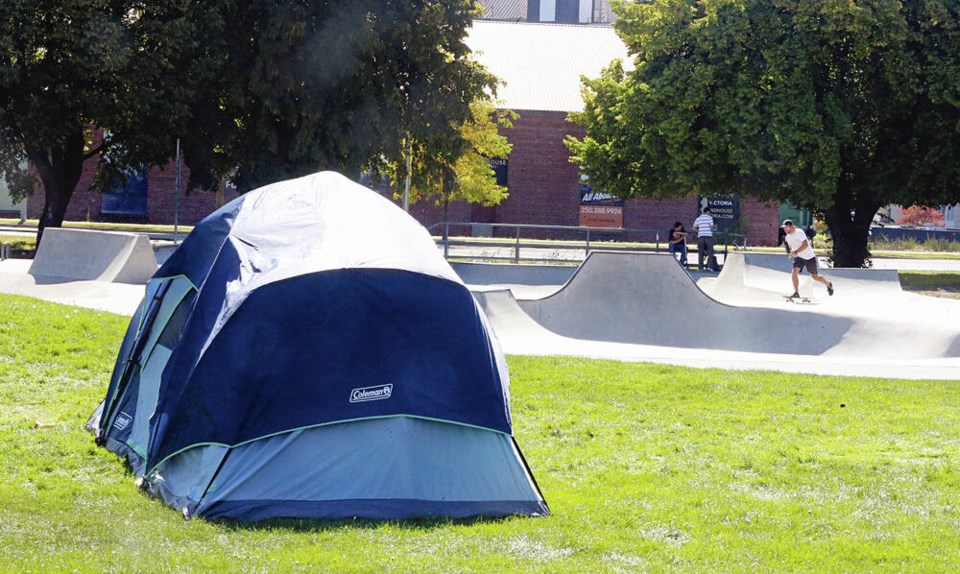Possession of illicit drugs is being banned near playgrounds and parks in a B.C. government amendment to its drug decriminalization policy. The government also announced plans for legislation this fall to further regulate public drug use. No details were released about the additional changes.
The province has toughened up its decriminalization policy — effective Monday — following concerns expressed by a number of communities, including Campbell River and others on Vancouver Island.
While municipalities welcomed the latest move, they called on the province to provide more money and support to tackle the drug-overdose crisis.
B.C.’s Ministry of Mental Health and Addictions said the federal government approved the new changes to its drug decriminalization policy.
In May 2022, the federal government gave the province an exemption from the law to allow for the removal of criminal penalties for people caught with a small amount of illicit drugs for personal use.
The latest changes mean illegal drug possession within 15 metres of playgrounds, waterparks and skate parks will be prohibited as of Sept. 18. Possession was already prohibited on school grounds and in child-care facilities.
The province said the amendments mean police can again enforce federal drug laws if people are found with illegal drugs near “child-focused spaces.”
Victoria Mayor Marianne Alto said in a statement that while decriminalization is one part of the response to the toxic drug crisis, it’s important to take steps that specifically protect children.
In Campbell River, Coun. Ben Lanyon called the province’s move a “step in the right direction.” Campbell River passed its own bylaw this summer to prohibit consumption of drugs within 15 metres of playgrounds and water parks.
It went further than the province by including places such as sports fields, tennis courts, picnic and bus shelters, and public facilities such as the library and local community centre.
Campbell River is seeing record numbers of police and bylaw calls for service and because of drug overdoses, Lanyon said.
Without adequate levels of police, the community will experience more trauma and a more difficult road to recovery, he said. A shortage of resources means local RCMP have not enforced rules around drug use or possession of small amounts of drugs in three years, he said.
“[The province] is trying some new things, often very compassionate things, but what we haven’t seen so far at a municipal level is funding” for what Lanyon calls “key ingredients” for recovery.
“We don’t have any detox beds in Campbell River despite having a very high per capita rate of drug addiction,” he said, adding there is not a significant amount of transitional housing, which helps people who have received treatment to avoid having to return to the street.
The municipality can work with the province but needs resources to keep the public safe, Lanyon said. If permissive exemptions are introduced around public drug use and possession, then security is required to deal with the collateral impacts, he said.
Campbell River representatives are meeting with provincial ministers at the Union of B.C. Municipalities annual meeting Sept. 18 to 22 in Vancouver. The city hopes to see support for a treatment facility, transitional beds, security and more resources for the overdose prevention site, Lanyon said.
In Nanaimo, where community associations have been rallying for more assistance from senior governments to deal with social problems, Coun. Paul Manly agrees with the province’s new rules. “It makes sense that people aren’t able to use wherever — in playgrounds or where children and families are.”
But like Lanyon, he said the challenge is that there isn’t a robust system in place for people who want to go into detox or treatment. “This whole decriminalization process is missing that element.”
“I see people who have experienced an overdose and they are saying, ‘Now I’m ready for treatment’ … but there’s no place to send them to,” said Manly, the executive director of a homeless shelter. “There’s not enough beds.”
Nanaimo Mayor Leonard Krog does not support public consumption of drugs but welcomes the new ban on drugs near playgrounds.
“Not even people who use drugs wants to walk the streets with their own children and have [them] … observe the public consumption of substances, which we all know are damaging and often deadly.”
The city is holding off moving toward its own bylaw, waiting to see what the province does this fall, he said.
Vancouver Mayor Ken Sim said the city had asked the provincial government to get Health Canada to make the change.
“This is a positive step forward in helping to find balance for our communities, including families, seniors, children, and our most vulnerable residents,” he said in a statement issued Thursday.
>>> To comment on this article, write a letter to the editor: [email protected]



